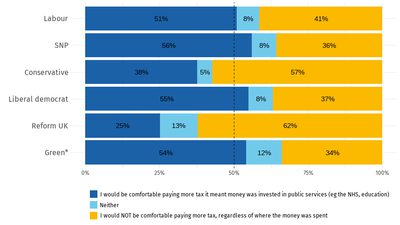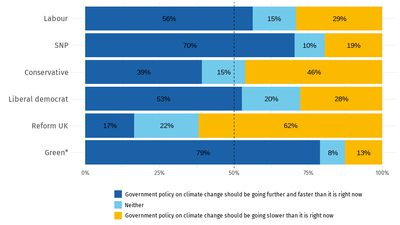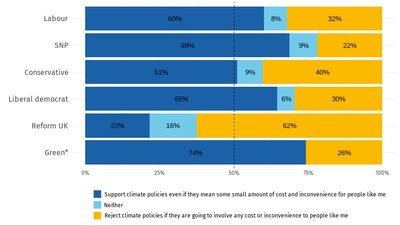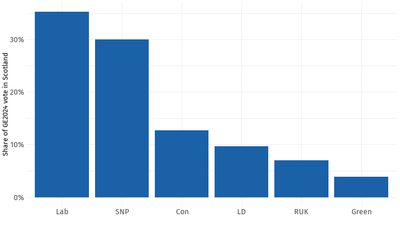Political leaders in Scotland must be bold on climate and tax
Article
Voters in Scotland support higher taxes and faster action on climate change. This was revealed in a “mega poll” commissioned by IPPR and Persuasion UK.
In every Scottish constituency (and all but two constituencies in England and Wales), more voters think government policy on net zero should be going further and faster than it is right now. Strikingly, across most Scottish constituencies, the balance of opinion also favours higher taxation to fund public services, as compared with just one-third of constituencies across the whole of Great Britain.
Here we delve deeper into these issues which are likely to feature prominently in the 2026 Scottish Parliament election, to understand how opinion varies across supporters of different parties.
On taxation, the majority of Labour, SNP, Liberal Democrat and the
Green voters feel comfortable with higher taxes. While these majorities
can be slim, they clearly outweigh the number of voters who are
expressly against higher taxes. Scotland already has a more progressive
income tax system which asks those with the broadest shoulders to make a
higher contribution than they would elsewhere in the UK.
This polling evidence shows these changes have not stoked opposition to higher taxes in Scotland. This comes on top of evidence showing the Scottish rate of income tax has not led to migration away from Scotland – indeed, quite the opposite, migration into Scotland increased when Scottish income tax began to diverge from the rest of the UK. Arguably, the choice to make Scottish income tax more progressive may even have played a role in shaping Scottish public opinion, opening space for a more positive discussion as to how we share the costs of public services fairly. Scottish voters have experienced tax increases and found they have not damaged the economy.
Figure 1. Progressive taxation in Scotland has not led to opposition to higher contributions among most parties’ voters.

Source: IPPR Scotland analysis of Persuasion UK/IPPR. 1,432 adults in Scotland w/c 1st July 2024. * Scottish Green Party results based on relatively small sample size (34 responses)
Among supporters of the major parties in Scotland, policy that goes further and faster on climate is the majority preference, with the exceptions of Conservative and Reform voters. That the Scottish government has tended to miss its climate targets and is currently reassessing its approach to 2030 does not appear to have led to support for a slowdown. Parties looking to poach voters from others’ support bases would do well to present credible plans to pick up the pace on net zero.
Figure 2.Majority opinion supports faster action on climate, across four of the six largest parties

Source: IPPR Scotland analysis of Persuasion UK/IPPR. 1,432 adults in Scotland w/c 1st July 2024. * Scottish Green Party results based on relatively small sample size (34 responses)
Politicians who recognise the public generally supports greater ambition on net zero worry that this support only exists in abstract terms. Presented with actual costs and disruption, they fear support will evaporate. However, the polling shows this is a minority position. 58 per cent of people in Scotland agree that the government “should continue to introduce policy which reduces the UK’s greenhouse gas emissions, even if it means some small amount of cost and inconvenience for people like me” and only 33 per cent think policies should not be introduced in those conditions. This is the majority view across supporters of all parties except Reform UK. The parties in Scotland should recognise that the electorate gives them permission to pursue effective climate policies. This holds for the Conservative party, despite their supporters having reservations about the pace of emissions reduction.
Figure 3. Most supporters of all parties other than Reform UK would support policies to tackle climate change even if they led to cost and inconvenience

Source: IPPR Scotland analysis of Persuasion UK/IPPR. 1,432 adults in Scotland w/c 1st July 2024. * Scottish Green Party results based on relatively small sample size (34 responses)
Taxation, climate and fairness are critical issues facing Scottish politicians. The transition to net zero is a huge opportunity for Scotland, but it will create costs and benefits that, unchecked, risk being unfairly distributed. This is a central finding of our research on heat transition, No Home Left Behind, but it stretches right across the transition. As the Just Transition Commission has argued, Scotland needs a new intergenerational social contract as part of a just transition, and that includes protection for areas currently dependent on high-emission activities, like Grangemouth. Tax should play a central role, underpinning and stabilising accelerated investment in net zero. But it must also underwrite the promise of a just transition, ensuring change reduces, and does not exacerbate, economic inequalities in Scotland.
Two important related points to close on. Point one: the 2026 election is some 20 months away, and voters’ opinions may change over time. Point two: successful parties can lead public opinion, not just respond to it. This data shows that any watering down of ambitions on either climate or progressive taxation in Scotland is unlikely to be an election-winning proposition. Real success – both in winning elections and leading effective solutions to the challenges Scotland faces – will belong to politicians who can lead the conversation, particularly by weaving the issues of climate, taxation and fairness together.
Addendum – Parties' Votes Shares
In the charts above, we’ve ordered the parties by their vote share in Scotland at the 2024 general election. As a reminder, this is how each party performed.
Figure 4. Vote share of the main parties in Scotland at the 2024 general election
